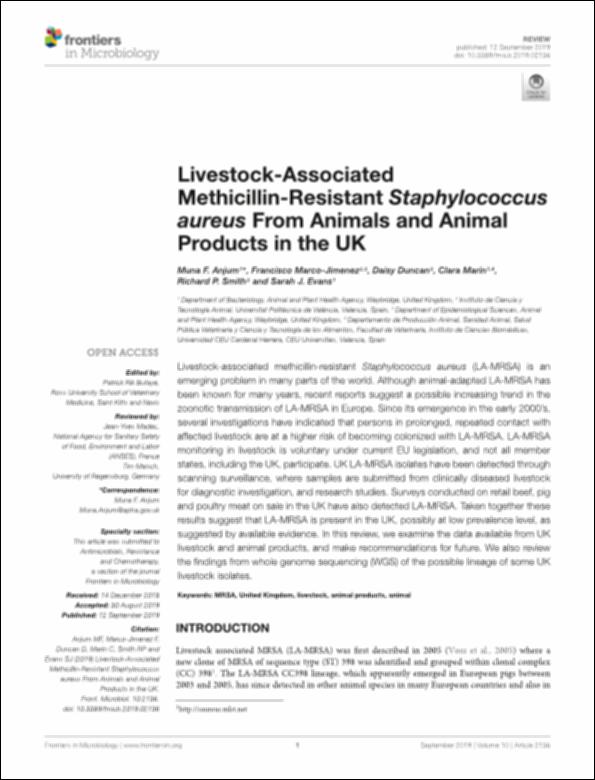Por favor, use este identificador para citar o enlazar este ítem:
http://hdl.handle.net/10637/11799Livestock-associated Methicillin-resistant "Staphylococcus aureus" from animals and animal products in the UK
| Título : | Livestock-associated Methicillin-resistant "Staphylococcus aureus" from animals and animal products in the UK |
| Autor : | Anjum, Muna F. Marco Jiménez, Francisco Duncan, Daisy Marín Orenga, Clara Smith, Richard P. Evans, Sarah J. |
| Materias: | Drug resistance in Staphylococcus.; Ganado - Bacteriología.; Animal products - Bacteriology.; Productos animales - Bacteriología.; Estafilococos - Resistencia a los medicamentos.; Livestock - Bacteriology. |
| Editorial : | Frontiers |
| Citación : | Anjum, M.F., Marco-Jimenez, F., Duncan, D., Marín, C., Smith, R.P. & Evans, S.J. (2019). Livestock-Associated Methicillin-Resistant Staphylococcus aureus from animals and animal products in the UK. Frontiers in Microbiology, vol. 10, art. 2136 (12 sep.). DOI: https://doi.org/10.3389/fmicb.2019.02136 |
| Resumen : | Livestock-associated methicillin-resistant Staphylococcus aureus (LA-MRSA) is an emerging problem in many parts of the world. Although animal-adapted LA-MRSA has been known for many years, recent reports suggest a possible increasing trend in the zoonotic transmission of LA-MRSA in Europe. Since its emergence in the early 2000’s, several investigations have indicated that persons in prolonged, repeated contact with affected livestock are at a higher risk of becoming colonized with LA-MRSA. LA-MRSA monitoring in livestock is voluntary under current EU legislation, and not all member states, including the UK, participate. UK LA-MRSA isolates have been detected through scanning surveillance, where samples are submitted from clinically diseased livestock for diagnostic investigation, and research studies. Surveys conducted on retail beef, pig and poultry meat on sale in the UK have also detected LA-MRSA. Taken together these results suggest that LA-MRSA is present in the UK, possibly at low prevalence level, as suggested by available evidence. In this review, we examine the data available from UK livestock and animal products, and make recommendations for future. We also review the findings from whole genome sequencing (WGS) of the possible lineage of some UK livestock isolates |
| Descripción : | Este artículo se encuentra disponible en la página web de la revista en la siguiente URL: https://www.frontiersin.org/articles/10.3389/fmicb.2019.02136/full |
| URI : | http://hdl.handle.net/10637/11799 |
| Derechos: | http://creativecommons.org/licenses/by/4.0/deed.es |
| ISSN : | 1664-302X (Electrónico) |
| Fecha de publicación : | 12-sep-2019 |
| Centro : | Universidad Cardenal Herrera-CEU |
| Aparece en las colecciones: | Dpto. Producción y Sanidad Animal, Salud Pública Veterinaria y Ciencia y Tecnología de los Alimentos |
Los ítems de DSpace están protegidos por copyright, con todos los derechos reservados, a menos que se indique lo contrario.


